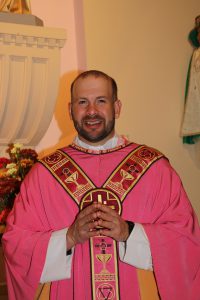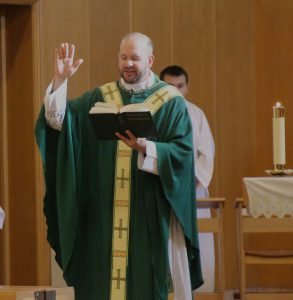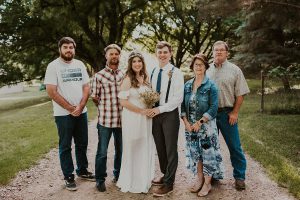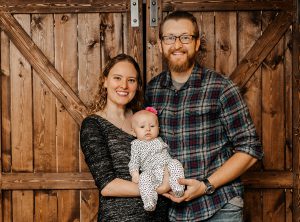
Bokeh purple proton background abstract - image
By Renae Kranz

Advent is a beautiful opportunity to wait with joyful hope for the coming of our Messiah. It can also be a time to refresh our souls with prayer and the sacraments, making ourselves ready for the Christ child on Christmas Eve.
The wait during Advent seems easy because we know what the end of the wait will bring. But in our daily lives, we often face times of waiting that can leave us discouraged and rob us of our hope. You might be waiting to find a spouse to share your life with. You might be waiting to have a child. Or, you might be waiting to be healed from a disease.
Whatever it is, the result you desire might seem impossibly out of reach; you wait so long that your hope has dwindled. But God doesn’t want us to lose hope. He wants us to know that he loves us so much more than we love ourselves and wants to give us all the good things we desire.
He wants us to renew our hope and to trust in Him.
Mary shows us the way
Put yourself in Mary’s shoes for a moment. After the angel Gabriel visited her and she gave her “yes” for the world, she would have nine months to wait for her son, the Son of God, to be born. There was probably some anxiety as she faced several unknowns: what would Joseph do, what would others think, would she be a good mother to Jesus, to God Himself?
I suspect there was great peace and quiet hope for Mary as well because of her deep faith and trust in God. This child would be the fulfillment of the hope of all the people of Israel who had waited centuries for this moment.
Today, as we light the candles on our Advent wreaths, Father Timothy Smith reminds us to look at how Jesus can come into our lives right now just as he came into Mary’s life. We need to prepare for Him to become a bigger part of our lives. One way is by increasing the virtue of hope in times of trial and waiting.
“In Luke’s gospel when she [Mary] says, ‘all generations will call me blessed,’ she is filled with this understanding that she is graced by God,” says Father Smith, pastor at Holy Cross, Ipswich, St. Thomas the Apostle, Roscoe, and Our Lady of Perpetual Help, Leola. “She has been given this grace, and in that is a joyful living hope for us as an example.”
So why do we need hope in our lives? Can’t we just power through and do this ourselves?
We don’t have to. In fact, we can’t. Instead, Jesus offers us the promise of his love and faithfulness.
Hope transforms waiting
In our fallen world, we often forget who we belong to and where we are destined to go—heaven. So when we face a challenge, we wait with restless hearts, not knowing where to turn or who will help us. We forget who loves us and where to find our hope. Our hope can only be in the Lord, not in the world.
In his encyclical, “On Christian Hope,” Pope Benedict XVI reminds us of the intimacy that hope creates between God and us through prayer:
“A first essential setting for learning hope is prayer. When no one listens to me anymore, God still listens to me. When I can no longer talk to anyone or call upon anyone, I can always talk to God. When there is no longer anyone to help me deal with a need or expectation that goes beyond the human capacity for hope, he can help me. When I have been plunged into complete solitude…; if I pray I am never totally alone.” (para. 32)
Father Smith assures us that our God keeps his promises and is trustworthy in all circumstances. He has found that learning more about the virtue we want to grow in can help us realign our thoughts. In this case, learning more about the virtue of hope and praying about it can help us increase it and realign our thoughts toward heaven.

“The biggest thing is to always go back to maintaining that relationship with God in prayer,” Father Smith says. “And so always acknowledging those thoughts, those feelings and those desires and keeping them related to God through constant conversation. Joseph Pieper, a Catholic philosopher, says that prayer and hope are naturally ordered to each other. Prayer is the expression and proclamation of hope. The hope itself speaks through prayer.”
Father Smith also recognizes that we might feel like the Lord knows our thoughts and feelings and we don’t need to pray about it. He has even felt that way himself at times. But he emphasizes that God wants to hear from us.
“We can always continue to relate to the Lord. And the more we do that, the greater that intimacy with God will be. And then we’re going to be invited to a greater intimacy with His love,” he says.
A main key to waiting in hope comes again from Mary, who waited with the Lord. Instead of waiting FOR the Lord to do something in our lives, we must wait WITH the Lord. When we do that, we will begin to desire what He desires.
As always, the Catechism of the Catholic Church clarifies the virtue of hope for us:
“The virtue of hope responds to the aspiration to happiness which God has placed in the heart of every man; it takes up the hopes that inspire men’s activities and purifies them so as to order them to the kingdom of heaven; it keeps man from discouragement; it sustains him during times of abandonment; it opens up his heart in expectation of eternal beatitude. Buoyed up by hope, he is preserved from selfishness and led to the happiness that flows from charity.” (CCC 1818)
Hope clarifies a calling
Before Father Smith became a priest, he was an up-and-coming businessman in the world of finance. He had learned a good work ethic from his parents and had a drive for self-sufficiency and success. But as he earned more money and continued to succeed, he became more and more despairing.
He described a point when he had received the largest check he had ever received. At that moment, he was the most miserable he had ever been.
 “The more personal security I stored up for myself, the more I found it lacking in real goodness that I was made for. And so there had to be real personal transformation,” Father Smith said. “There became a heightened awareness in me that the real thing that I was created for was something I would never be able to buy. It would be something I really wouldn’t even be able to touch. It’s something that wasn’t tangible and ultimately, that’s heaven.”
“The more personal security I stored up for myself, the more I found it lacking in real goodness that I was made for. And so there had to be real personal transformation,” Father Smith said. “There became a heightened awareness in me that the real thing that I was created for was something I would never be able to buy. It would be something I really wouldn’t even be able to touch. It’s something that wasn’t tangible and ultimately, that’s heaven.”
At that point, Father Smith began a re-evaluation of his life which he says led to a “beautiful transformation, personal discovery and personal conversion.” He had to reorient himself away from the things of this world and back toward the things of heaven. That process lead him to seek “lifelong, eternal peace and also eternal goodness, which can be found in Jesus.”
He went on to enter seminary and become a priest. He says he now understands that this is all just part of the human experience, that we can get distracted by the things of the world and forget about the good things God has in store for our lives. For him, the lives of the saints were influential to him finding his true calling, especially Blessed Cardinal Nguyen Van Thuan.
Cardinal Thuan was the archbishop of Saigon in the 1970s when it fell into the hands of the North Vietnamese communist government. He was imprisoned for 13 years, nine of which he spent in solitary confinement. This would normally be a place where hope withers away and despair takes its place. But Thuan’s faith was especially powerful, which fed into his hope and kept him from despair.
As he waited in prison, Cardinal Thuan dedicated himself to prayer and living his life, solitary as it was, in communion with God. He wrote reflections about hope that were circulated to the other prisoners and eventually distributed around the world. Those reflections became known as “The Road to Hope.”
“He was an amazing example of keeping one’s hope rooted in the hope for heaven and in love with Jesus and through prayer,” Father Smith says. “And with that true hope for heaven, there really isn’t anything that we cannot go through in this life so long as we see things properly. And that again, takes place over time. You know, each of us has a different journey to make to get there. But the goal is the same, eternal life in the kingdom of heaven.”
Life isn’t always rosy
Sometimes in life we hope for one thing but a different, less desirable thing happens. It can cause our hope in the Lord to be tested. Helen Crow’s story followed this less desirable path.
On Ash Wednesday 2010, Helen and her husband, Allan, parishioners at Holy Trinity in Huron, got a call they never thought they would get. Navy personnel were on the other end of the phone and they wanted to meet with them. Helen knew the news wouldn’t be good.
Their oldest son, Jeremy, had been in the Navy for 17 years by then. When they met with the Navy personnel, they learned their son had been killed. They weren’t able to give them all of the information, but it didn’t really matter in the end. The only thing that mattered was that he was gone.
Helen said at first she went into shock. Even though her son worked with the Navy Seals transporting them, she never thought she would be in this position. She had spent the last 17 years praying for his safety and eventually a safe return home. She waited and hoped and appreciated the few times they had contact with him or got to see him.
One of the first things Helen did to begin dealing with the news of her son’s death was to turn to God in a deeper way. Since it was Lent, she began going to Stations of the Cross on Friday’s. She found herself especially drawn to the station’s devotions said through the eyes of Mary, sometimes known as Mary’s Way of the Cross. She understood that Mary knew her pain.

Helen continued to see things in new ways as she dealt with her grief. The priest at her parish at the time told her something that helped increase her hope.
“He told me that the closest we are to the people who have gone before us is when we’re at Mass. And so, I went to Mass before, but that puts even more of a meaning to it,” Helen said.
She did struggle as anyone would. About six weeks after her son died, she felt herself sinking lower into a bad place and needed to get back to her routine. She attended a seminar that helped get her back on the right path, and she began to understand that her feelings were valid and her path through her grief would be her own. She didn’t need to compare herself to anyone else.
But she did need hope.
She opened herself up to uplifting music, time in adoration and silent retreats at Broom Tree. These things helped her become more prayerful even as she realized her path could have gone a darker way. She says she was never angry, but she asked why many times. She learned to put her hope and trust in God and allow herself to be drawn deeper into relationship with him.
“I’ve been told that God wouldn’t allow anything bad to happen unless He can bring good out of it,” Helen says. “And it might not be something that we even see, it might be in time. When you look at a tapestry, if you look at the back it’s not pretty. It’s a mess. But when you look at the other side, it’s beautiful.”
Now Helen and Allan enjoy time with their other children and grandchildren. She also tries to help others who are grieving. She knows hearing someone else’s story can give someone who might be struggling hope when they need it.
Something she read in the book “Unexpected” by Christine Caine struck her: “Hope is the unshakeable confidence in God. It doesn’t deny the pain, but it gives permission to believe in a new beginning.”
Hope brings life
Jordan and Mikaela Pannell, parishioners at St. Therese Parish in Sioux Falls, understand the challenge of waiting for something they really want. They started out waiting for each other, and later found themselves waiting for something even more.
Before Jordan met Mikaela he had decided to stop dating for a while during college until he was fully ready for the commitment of a relationship. He says his hiatus lasted three or four years.
“I was trying to work on myself and just waiting for the right person to walk along,” Jordan says. “I learned after high school that I didn’t find myself nearly ready enough to try to have a super committed relationship. So I figured I’d be open to dating, but at the same time be willing to wait for the person that God puts in front of me.”
This decision wasn’t without its challenges. Jordan had many friends who were getting engaged or were in committed relationships, but rather than let that bring him down, he surrounded himself with other good, chaste men to walk through that time with. Those friends didn’t just fall into his lap, either. He had to put himself into places like daily Mass and Catholic ministries at college to find good men who he could talk to and find support from.
It wasn’t quite as easy for Mikaela. She came from a small town where many couples who were high school sweethearts got married, including her own parents. That didn’t happen for her which threw her off a bit.
“I was praying probably a little more persistently than Jordan, but I was comfortable with the fact that I was forming really good friendships and forming myself,” Mikaela says. “I figured however long this takes, it’ll be okay because I know God’s got it. And it’s worth it, I think was the big thing, like this is worth it.”

Once the two met each other and started dating, their courtship was quick, only a little over four months. They knew they were meant to be together, and Mikaela credits that confidence to their individual choices to wait for the right person.
“I think that’s important really for both of our stories. We ended up meeting each other because we were both in youth ministry,” Mikaela said. “If we hadn’t both been doing that waiting for each other and for what we knew God wanted for us, that probably wouldn’t have happened. I don’t think I would have been in youth ministry had I not chosen to take that path.”
That trust and hope in God’s plan for their lives would be tested shortly after they married. Jordan and Mikaela assumed they would have no problem having children and they were anxious to get their family started. However, Mikaela had been tracking her cycles for years already and knew some things were not quite right.
With the help of good health care and her use of the Creighton Method, she was already being treated for low progesterone. But after seven or eight months of trying to get pregnant, they knew something else had to be going on. Frustration was beginning to build.
The couple worked with their doctors and a midwife to try to figure out what was keeping them from conceiving. They found additional underlying issues and dealt with them, but nothing seemed to be the sure solution. They tried fertility medications as well, which were hard on Mikaela and ultimately were not the solution either. It would come down to trust in God.
“I think everybody at one point or another is going to struggle with the hope part, and I know we did from time to time for sure,” Mikaela said. “We had to keep reminding ourselves in our prayer life together. It became that trying to align our will with God’s will, his timing, not our timing. And that was helpful. And also embracing where we were in that period of our life and what we were able to do.”
Besides prayer, the Pannell’s turned to others for support. They learned to appreciate the time to build up their marriage and make it rock solid for when children did come along. And they found opportunities for “parenthood” in other ways: spending time with children through various ministries, being godparents, and babysitting for others. They embraced those roles instead falling into a “poor me” attitude.
“There were definitely the hills and the valleys as far as our faith goes. I think starting out it was super hard on us just because we thought we had done everything right,” Jordan says. “We had a lot of questions. What did we do wrong? Are we getting punished? There’s just a lot of uncertainty and questions that arose especially pretty early on. And then eventually you get past this hump where you start going up the hill again.”
“And then you realize you can’t do this without God,” Mikaela added.

Finally, after almost two years, Jordan and Mikaela got good news. Jordan was sure his wife was “pulling his chain” when she told him they were expecting. There were lots of tears and the feeling that a miracle had finally happened for them.
Their daughter, Melody Marie, was born June 12 of this year. The couple has learned to embrace periods of waiting and uncertainty in their lives and put their trust squarely with God.
“It’s a lot easier for us to acknowledge the waiting and depending on God’s will,” Jordan says now. “And just knowing that He’s got us.”
Prepare your hearts
Hope isn’t always easy to hold onto when life throws you a curve ball. But Father Smith reminds us not to be too hard on ourselves if we are struggling. He says we should continue to pray, frequent the sacraments (especially confession), learn more about our faith, and turn to the saints for help and inspiration. And also remember to listen to what God might be saying to you.
“He’ll always give us an opportunity to be taken out of our comfort and really reevaluate how much dependence we’re putting on him and how much really in our own self-sufficiency we’re really going off of and trying to fulfill our deepest longings on our own, rather than looking at Him,” Father Smith says.
Confession can be a critical component to increasing our faith, hope and love. Sin can cause us to lose these virtues. Repentance and the Lord’s forgiveness renew them and restore our relationship with Him.
“When I go to reconciliation and my sins are forgiven through Jesus by the authority of his Church, and I know that I have God’s grace flowing in me, I know my hope for heaven is renewed,” Father Smith says. “I know that I have restored my relationship with God and that if something were to happen, I am ready for the Lord.”
Take the waiting time of Advent to prepare for Jesus and increase your hope. Our hope for the joys of heaven can sustain us through the hills and valleys of life. Come, let us rejoice!


